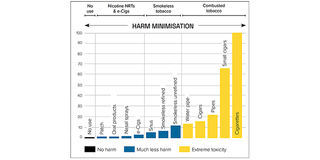Lessons Kenya can adopt to help smokers quit and reduce tobacco-related deaths
Sponsored by Campaign for Safer Alternatives

By Joseph Magero
May 30 marks World Vape Day, a global moment to reflect on the role safer nicotine alternatives can play in improving public health.
For Kenya, this comes at a significant time as Parliament considers the Tobacco Control (Amendment) Bill 2024 and our efforts to address 12,000 annual smoking-related deaths.
Almost 15 percent of Kenyan men smoke, and traditional tobacco control measures are failing to reduce this stubbornly high number. It’s a dilemma facing many of our neighbours across the African continent.
More than 10,000km away in a corner of Europe, a very different story is playing out. Sweden has slashed its smoking rates to some of the lowest in the world, largely thanks to safer nicotine alternatives such as snus, vapes and oral nicotine pouches.
Although half of all Swedish men smoked a few decades ago, Sweden’s male smoking rate is now just one-third of Kenya’s, and it continues to fall. Swedes now enjoy the lowest incidence of smoking-related disease in Europe.
So, what has Sweden got right that Kenya could learn from?
I recently co-authored, the comparative study Tale of Two Nations: Kenya vs. Sweden, which examines how different policy approaches have produced different health outcomes. This research highlights the importance of evidence-based policymaking that considers real-world impacts on public health.
Both Kenya and Sweden have a history of using oral stimulants. Swedes have traditionally used snus, which public health policy recognised as far less risky than smoking and promoted them as a safer alternative, before the arrival of vapes and, more recently, nicotine pouches. These have accelerated the decline in smoking rates.
In Kenya, while there is a history of using stimulants like khat, lawmakers have been reluctant to embrace oral nicotine pouches and other alternatives despite their lower health risks.
The proposed amendments to Kenya's tobacco control legislation include provisions that would significantly restrict access to safer alternatives through flavour restrictions and complex licensing requirements.
While these measures aim to protect public health, they may inadvertently limit options for current smokers seeking to reduce their health risks.
Research suggests that overly restrictive approaches can drive users back to conventional cigarettes, potentially undermining broader public health objectives.
Communities with limited resources, who might benefit most from affordable smoke-free alternatives, could be disproportionately affected by policies that reduce market accessibility.
Kenya’s policy decisions extend beyond our borders, potentially influencing tobacco control approaches across East Africa and the broader continent. The choices we make today could shape how other African nations address their own tobacco-related health challenges.
On this World Vape Day, Kenya can examine successful international models while crafting policies suited to our context. Sweden’s experience demonstrates that harm reduction strategies, when properly implemented, can significantly reduce smoking-related disease.
Our legislators face decisions about balancing public health considerations. Evidence from countries embracing comprehensive approaches suggests this may offer the best prospects for protecting Kenyan lives.
Sweden has shown us the way forward. Will we learn from their success, or will we let this crucial opportunity slip away?
AboutCampaign for Safer Alternatives
Campaign for Safer Alternatives is an international Pan-African non-governmental organisation dedicated to achieving 100 percent smoke-free environments in Africa. We are the unifying voice for consumer organisations advocating for tobacco harm reduction in Africa, promoting discussion and the exchange of information, and potential actions to reduce exposure to tobacco-related harm. More information: https://safer-alternatives.org
____________________
Joseph Magero is the Chairman of Campaign for Safer Alternatives